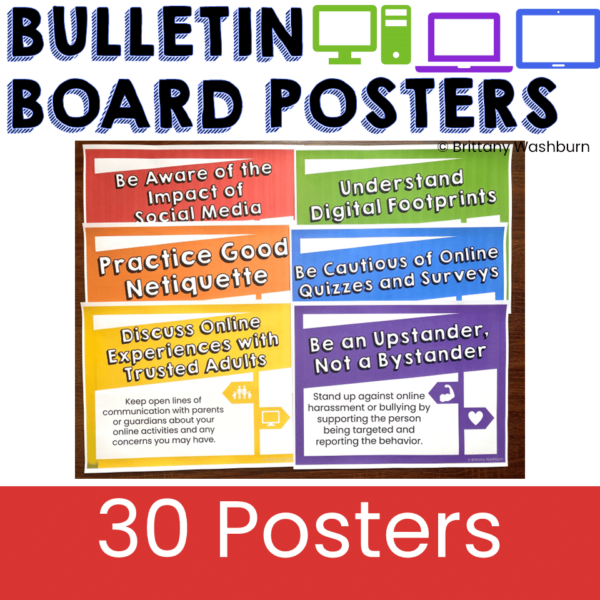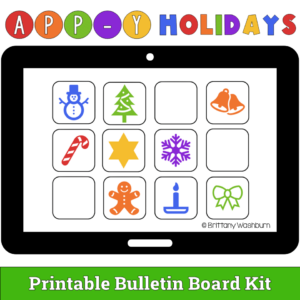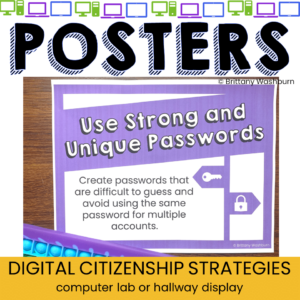Description
Teach and review digital citizenship and media literacy strategies with this set of 30 posters that can be used as a bulletin board or display. Stylish yet academic posters, with both color and black and white options. Just print and set up!
1. Be respectful online: Treat others with kindness and respect, just as you would in person.
2. Protect your personal information: Never share your full name, address, phone number, or other personal details online without permission from a trusted adult.
3. Think before you post: Consider the consequences of your online actions and remember that what you share can have a lasting impact.
4. Keep passwords private: Don’t share your passwords with anyone except your parents or guardians.
5. Be mindful of online friends: Only add or chat with people you know in real life and avoid accepting friend requests from strangers.
6. Recognize fake news: Learn to identify unreliable or false information by fact-checking with trusted sources.
7. Respect copyright: Don’t use or share others’ work (such as images, videos, or text) without permission or proper attribution.
8. Ask for permission: Always ask for permission before using someone else’s work, including images, videos, or text.
9. Report and block: If someone online makes you feel uncomfortable or if you encounter inappropriate content, report it to a trusted adult and block the person or site.
10. Be critical of advertisements: Understand that ads are designed to persuade you, and question their claims or intentions.
11. Be a responsible digital citizen: Use technology and the internet in a positive, constructive, and ethical manner.
12. Balance screen time: Limit the amount of time spent on devices and ensure a healthy balance with other activities.
13. Be a good online bystander: If you see someone being cyberbullied or mistreated online, don’t participate, and instead support the person being targeted.
14. Protect your online reputation: Be mindful of what you post online as it can affect your future opportunities and relationships.
15. Understand online privacy settings: Learn how to adjust privacy settings on social media platforms and online accounts to control who can see your information.
16. Be cautious with downloads: Only download files from trusted sources and scan them for viruses or malware before opening.
17. Be aware of online scams: Learn to recognize and avoid online scams, such as phishing emails or fraudulent websites.
18. Be a responsible online gamer: Follow game rules, be respectful to other players, and avoid sharing personal information while gaming.
19. Be mindful of your digital footprint: Understand that everything you do online leaves a digital trail that can be traced back to you.
20. Ask for help: If you come across something online that confuses or upsets you, ask a trusted adult for guidance and support.
21. Understand the consequences of cyberbullying: Cyberbullying is hurtful and unacceptable. Remember that your online actions can have real-world consequences.
22. Be skeptical of online offers or requests for money: Avoid sharing financial information or sending money to unknown individuals or organizations online.
23. Seek reliable sources: Learn to identify credible and trustworthy sources for information and research.
24. Use strong and unique passwords: Create passwords that are difficult to guess and avoid using the same password for multiple accounts.
25. Be aware of the impact of social media: Understand that what you post on social media can be seen by many people and may be difficult to delete or undo.
26. Practice good netiquette: Follow polite and respectful behavior online, including using appropriate language and refraining from cyberbullying or trolling.
27. Discuss online experiences with trusted adults: Keep open lines of communication with parents or guardians about your online activities and any concerns you may have.
28. Understand digital footprints: Learn that your online activities can be tracked and leave a permanent record, impacting your online reputation.
29. Be cautious of online quizzes and surveys: Avoid sharing personal information in online quizzes or surveys unless you are certain of their legitimacy.
30. Be an upstander, not a bystander: Stand up against online harassment or bullying by supporting the person being targeted and reporting the behavior.
Why you need this in your life:
With all of the current style trends out there, why not go with a colorful classic that is sure to be in style for years? It will save you time and money down the road when you don’t have to redecorate your classroom just because a color or trend went out of style. Print and laminate once and you’re good to go!
This bulletin board is both academic and decorative. Best of both worlds!
***************************************************************************************
Copyright © Brittany Washburn. Purchasing this file entitles you to ONE classroom use. You may use this with multiple classes but may not share with any other teachers. Copying for more than one teacher, classroom, department, school, or school system is prohibited. This product may not be distributed or displayed digitally for public view. Failure to comply is a copyright infringement and a violation of the Digital Millennium Copyright Act (DMCA). Clipart and elements found in this PDF are copyrighted and cannot be extracted and used outside of this file without permission or license. If multiple licenses are needed for use my more than one teacher or in more than one computer lab, additional licenses are discounted.
If you would like to get updates on NEW and CURRENT resources for technology teachers…



















Reviews
There are no reviews yet.